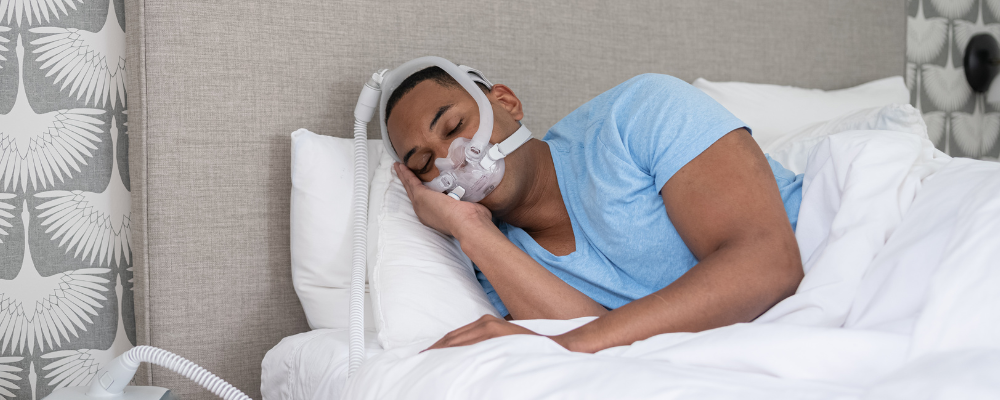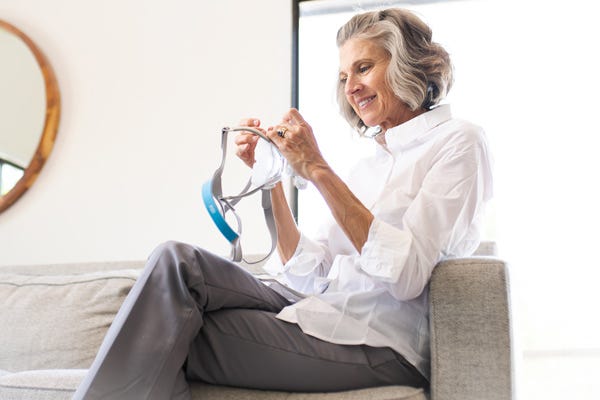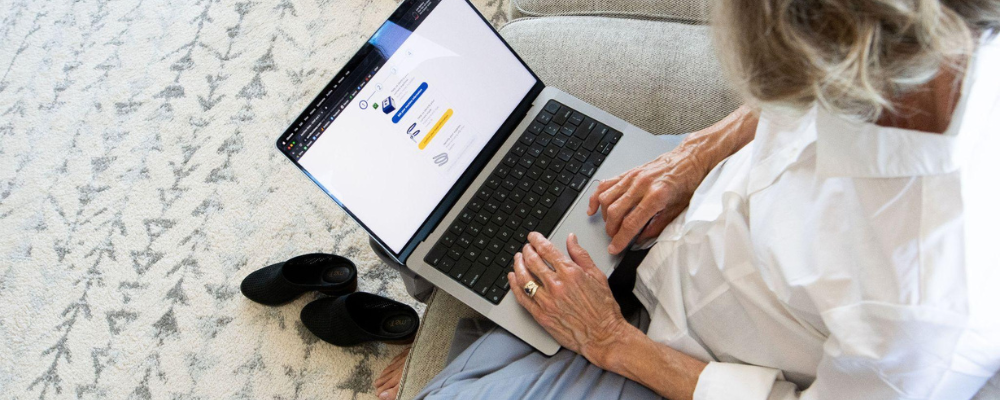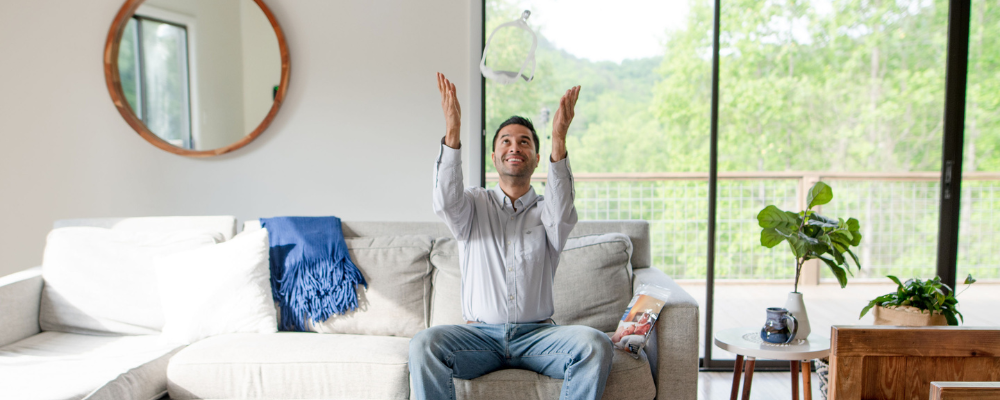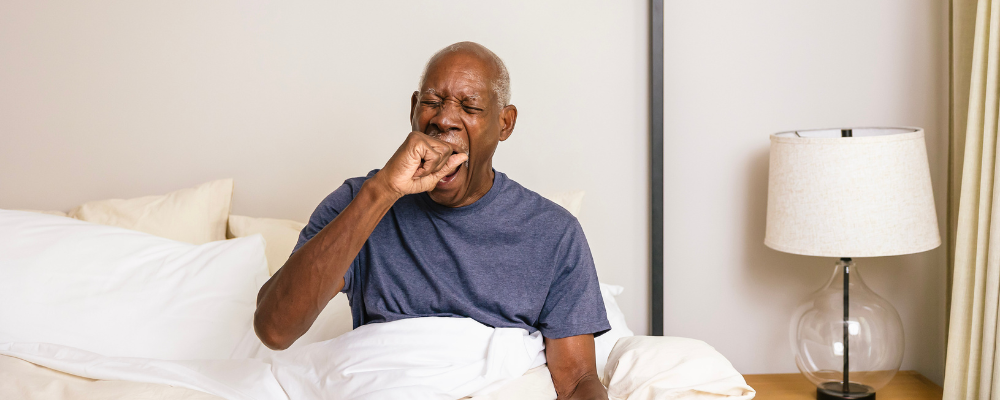The benefits of CPAP machines are numerous and well worth adjusting to the headgear! Today we’re offering up a refresher for experienced sleep apnea patients asking themselves something like, “Ugh, why am I still doing this?” This is also an excellent overview for newcomers curious about the health benefits of CPAP therapy. Bolster your resolve, and let all of this information sink in as you commit (or recommit!) to your CPAP therapy regimen.
IN THIS ARTICLE:
7 Major Benefits of CPAP Machine Treatment
The Takeaway: CPAP Therapy is Worth It
CPAP SUPPLIES THROUGH INSURANCE:
Aeroflow Sleep is in-network with most primary insurance companies and is accreditted by Medicare and Medicaid. Complete our Qualify Through Insurance Form, and we will automatically check to see if your plan covers CPAP supplies; including a machine, mask, and accessories. ***Must have a sleep study to qualify.***
You will also receive the care and attention every sleep apnea patient deserves; one-on-one clinical support in-home or via telehealth, a dedicated Sleep Specialist you can contact during business hours, and a user-friendly online portal with tailored replacement schedule, important updates and notifications, and educational resources.
Let us take the headache out of healthcare. Join the Aeroflow Sleep family today! It only takes 5-7 minutes to get started.
That Pre-CPAP Life
For those who have been on the scene for a while, you may or may not remember how bad it was before APAP/BiPAP/CPAP therapy began. Before diagnosis, many patients suffer with constant fatigue, daytime sleepiness, and irritability. Some have more puzzling symptoms like dry mouth, nasal congestion, and high blood pressure as well. Sometimes, people are tested for multiple conditions before they even land on obstructive sleep apnea (OSA). Starting the right treatment can be a journey in itself!
Here are a handful of sleep apnea symptoms that may alert you about needing CPAP:
- Loud Snoring: It is stunning how many people end up diagnosed with OSA because their partner couldn’t sleep through the racket. Snoring jokes are timeless! But there comes a point where it stops being funny. That’s a good time to call your healthcare provider.
- Mood Swings: Tired people are often grumpy people. For those with severe sleep apnea, the overwhelming irritability can create strain on your relationships. Friends, coworkers, and even spouses who know you well may feel antagonized.
- Low Self-Esteem: When you sense that people find you hard to be around, the guilt can also hit you like a bag of bricks. Many patients assume their bad attitude and behavior speaks to their character instead of their health. But the fact remains that sleep apnea patients have an underlying sleep disorder; not a character flaw. Behavioral therapy is always an option, but CPAP therapy will target the medical cause.
- Insomnia: It turns out that it's quite common for people to experience both insomnia and obstructive sleep apnea simultaneously. Sleep medicine and insomnia-specific prescriptions won't work on OSA though. If you are still constantly waking up, even on those medications, that's another sign to call your doctor about CPAP therapy.
- Headaches: Remember how painful and obnoxious these could be first thing in the morning? Sleep apnea headaches tend to wear off in an hour or two, but it’s not a great way to start the day.
- Inability to Exercise: Many sleep apnea patients report that they’re just too tired to bother with exercise. The only walking in their routine is to the coffee pot. They resort to caffeine to simply function.
- Exhaustion: Daily life feels intolerable. Exhaustion that seems to seep into your very bones is due to poor sleep quality. Sleep medicine doesn’t always fix it, and you struggle to think clearly at home and at work. Everything just feels so much harder.
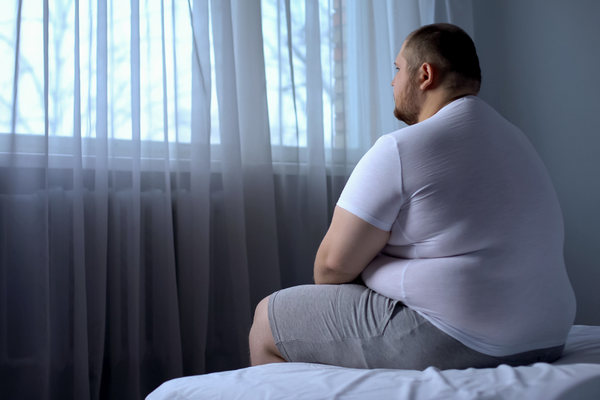

7 Major Benefits of CPAP Machine Treatment
Not such a fun trip down memory lane, is it? And if these symptoms are still plaguing you because you haven't tried CPAP therapy yet, take a look at that grass that's always greener on the other side! There are 7 major benefits you can get from CPAP machine treatment:
1. A Healthier Heart
Heart disease is one of the worst issues caused by obstructive sleep apnea. Treating OSA helps control hypertension. This can keep your ticker kicking to decrease the risk of heart attacks.
2. Lower Risk of Obesity
Sleep apnea treatments aren't just for staving off heart failure. CPAP treatment actually lowers your risk of obesity, improving your overall health and quality of life.
3. Lower Risk of Diabetes
Controlling your glucose levels lowers your diabetes risk factors. CPAP therapy is known to improve glycemic control. Sleep apnea patients with type 2 diabetes have a lot to gain.
4. Less Brain Fog
Imagine how a better night's sleep could affect your ability to function! CPAP devices help by providing continuous airflow that prevents tissues from collapsing into the airways.
5. Improved Mental Health
Now, we're getting into the big stuff. Getting enough sleep while depressed is difficult yet crucial in the battle against mental health. It can be anxiety-inducing to wake up gasping for air, which is another common symptom of sleep apnea. Luckily, we know that CPAP treatment makes improvng your mental health possible! It may reduce anxiety on the one hand and depression on the other by helping your body get the rest it needs to repair the mind.
6. Reduced Accident Risk
By treating the symptoms of sleep apnea, you'll also do less drowsy driving. At least, you'll manage the risk more sensibly. Being fully awake and present will reduce your risk of causing potentially deadly accidents in the workplace. This is especially true for commercial truck drivers who can spend up to 11 hours behind the wheel of a big rig each day. CPAP therapy is something you should really care about when you, them, and everyone in a motor vehicle is unsafe.
7. Better Qualify of Life
Last but certainly not least, many patients are astonished to find an increase in their energy levels after CPAP use. Real patients have said that their CPAP machine has changed their lives, that they are sleeping well and living better, and that without it, they wouldn't survive. There are some growing pains to be aware of though. Advancement and improvements take time, and first-timers may find the experience off-putting. Hang in there! All good things to those who wait.
CPAP Supply Side Effects
Let's dive into a handful of those growing pains and the solutions we've found work best:
- Wearing a CPAP Mask: It can be awkward, uncomfortable, or claustrophobic. The best thing you can do is to actually wear it more. Watch TV, read a book, or take a nap in it so you slowly adapt to the feel of your CPAP mask.
- Feeling Bloated: Swallowing air (aerophagia) is never a good thing, and you may feel boated from it. In this case, you may need to lower your air pressure settings, so talk to your doctor if this side effect is a problem for you.
- Insomnia: Hold up, isn't that one of the symptoms of sleep apnea already? Yes, difficulty of falling asleep or staying asleep may be a side effect of your CPAP therapy too, but it's not what you think. This is due to the sensation of continuous positive airway pressure; not true insomnia. Once again, you may need to lower your air pressure settings, and remember, talk to you doctor before changing them!
- Sore Throat: Waking up with a sore throat can mean a lot. On CPAP, it usually means your environment is too dry. Sometimes, a humidifier can help create the warm, moist environment you need while you sleep.
- Dry Mouth, Eyes, or Nose: This side effect typically presents itself when you're wearing a full-face CPAP mask and could be due to a poor seal or a mask leak. To solve this puzzle, Aeroflow Sleep invites you to watch the first episode of Weiss Words, starring Dr. Carleara Weiss, for some expert advice. Ring the bell to subscribe!
- Skin Irritation: Some sleep apnea patients wake up to find red marks, nose sores, even acne on their face after wearing a CPAP mask. Any skin irritation can result from how the mask fits. You may need a different mask type entirely. Aeroflow Sleep now offers an exclusive mask-fitting technology, so ask your dedicated sleep specialist to find the best fit for you.
The good news is that these side effects usually decrease, and you get better sleep as you adjust.
Alternatives to CPAP
Okay, so the benefits of a CPAP machine are clear, but there are a few alternative treatments for sleep apnea you may want to ask your doctor about too:
- Lifestyle Changes: Simple lifestyle changes that promote weight loss can reduce the amount of throat muscle tissue available to push down on your airways. Therefore, your obstruction and obstructive sleep apnea may clear on its own.
- Positional Aids: Special pillows can keep you from rolling onto your back, which is the worst sleep position for OSA patients. Because gravity works against you, pushing any neck fat down on your airways too, we recommend sleeping on your side.
- Surgery: It can be a sensible option for some obstructive sleep apnea patients. Removing enlarged adenoids or tonsils are one solution, or you may even find yourself exploring outpatient procedures for sleep apnea. Ask your doctor if your OSA can be managed surgically.
The Takeaway: CPAP Therapy is Worth It
CPAP treatment is worth the effort, even if you're kind of over it already or if you're worried about just getting started. Aeroflow Sleep will help you navigate any overwhelming feelings by offering you one-on-one assistance though. We pride ourselves on pairing you with a dedicated Sleep Specialist who can talk to you about anything, especially sleep apnea and your CPAP supplies. As you consider CPAP machines, different types of masks, or other treatment options beyond CPAP, reach out to us for guidance. We're just a click away!
References
Celmer, Lynn. “CPAP Improves Glycemic Control in Type 2 Diabetics with Sleep Apnea.” American Academy of Sleep Medicine, AASM, 3 June 2013, https://aasm.org/cpap-improves-glycemic-control-in-type-2-diabetics-with-sleep-apnea/.
Celmer, Lynn. “CPAP Therapy Reduces Symptoms of Depression in Adults with Sleep Apnea.” American Academy of Sleep Medicine, AASM, 22 Sept. 2015, https://aasm.org/cpap-therapy-reduces-symptoms-of-depression-in-adults-with-sleep-apnea/.
“Drivers Are Falling Asleep Behind the Wheel.” National Safety Council, NSC, 2022, https://www.nsc.org/road/safety-topics/fatigued-driver?


